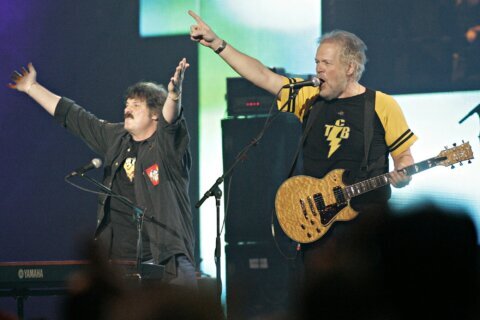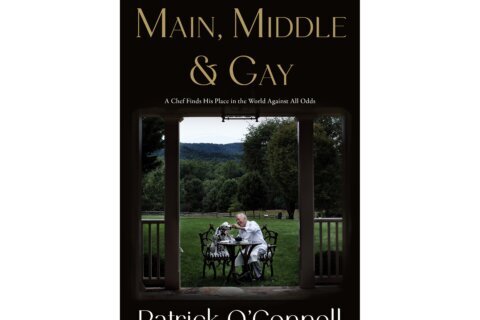WASHINGTON — Imagine growing up in the D.C. area, finding a surprise mentor in Neil Young in Georgetown and being tapped by Bruce Springsteen to join the E Street Band.
That’s the story of Nils Lofgren, who plays three shows at The Birchmere this weekend.
“I never — when I hit the road at 17 — would have been greedy enough to think that 50 years later I would have a run of hometown shows and be working on a new album I’m proud of,” Lofgren told WTOP. “It’s a homecoming. We’re hoping that my 91-year-old mom will get there and all of my brothers will play. This is the area I grew up in and really cut my teeth in.”
What songs can we expect to hear?
“Years ago, Fantasy Records did a 10-disc box set and let me handpick the best of 50 years,” Lofgren said. “So I had to handpick the best 200 songs of 50 years and I have all these songs to choose from. … I’ve got my brothers with me and Greg Varlotta, who’s been working with me 10 years, tap-dances and plays trumpets. I may even try tap dancing in the show!”
Born on the south side of Chicago in 1951, Lofgren received his first instrument at age 5.
“I asked for accordion lessons and my parents didn’t know they were going to pay for nine years of it,” Lofgren said. “I fell in love with the study of music. After the waltzes and polkas with the accordion, my teachers took me into classical. Nine years of classical studies was a great backdrop when we all fell in love with the Beatles, Stones, Hendrix, Motown, Stax/Volt.”
At age 8, his family moved to Garrett Park, Maryland, where he got bit by the rock ‘n’ roll bug.
“One night in D.C., I saw The Who at Constitution Hall, then we all ran over to see Jimi Hendrix Experience at the Ambassador Theater,” Lofgren said. “I still remember leaving that night … feeling an uncomfortable possession of: ‘Dude, you have to drop out of school and try to be a rock musician.’ I go, ‘I can’t do that,’ and this like possession saying, ‘No, we’re doing that.'”
So, Lofgren formed his own startup band, performing at local teen clubs.
“When I was 14, I started on guitar, my brother Tommy showed me my first chords,” Lofgren said. “I had a band called The Waifs … I had a band called The Grass … just local cover bands. But Grin was my first professional band when I was 17. (We) hit the road with original music looking for record deals. We struck out in auditions in New York and decided to go to L.A.”
Three weeks before leaving, Lofgren met Neil Young at The Cellar Door in Georgetown.
“I’d sneak backstage and ask advice,” Lofgren said. “I walked in on Neil Young and Crazy Horse and said, ‘Hey, I’m 16.’ … Neil Young had his guitar just looking at me and said, ‘Do you have any songs?’ … I sang him four or five songs and he said, ‘Those are really good. Why don’t you hang out for a couple days with me and watch the shows and let’s get to know each other.’ When he left town, he kept calling me and said, ‘Look me up when you get to L.A.'”
Sure enough, they reconnected in L.A.
“True to his word, he took us under his wing,” Lofgren said. “His producer, David Briggs, moved me into his home and was our mentor. On that rocky ride looking for a record deal, a year later when I was 18, Neil and David said, ‘We’re doing this project ‘After the Gold Rush.’ We want you to play guitar, piano and sing.’ So at age 18 to make that album with Neil Young was an extraordinary experience. … No greater mentors than Neil Young and David Briggs.”
During this time, Lofgren contributed to the arrangement of Young’s hit “Southern Man.”
“Neil said, ‘We need you to play piano,'” Lofgren said. “I’d come from the old accordion polka … so I started doing the octave thing on my left hand and Ralphie (Molina) started double-timing the drums. We got into this roaring double-time groove. When they came back from lunch, David and Neil were like, ‘What the heck is that?’ We’re like, ‘That’s “Southern Man” with a polka beat.’ We all laughed and said, ‘That feels great. Let’s do it in the solo and at the end.'”
Thanks to his Neil Young resume, Lofgren got a shot to make his own albums with Grin.
“Grin made four albums — no commercial success, but we got a lot of good reviews,” Lofgren said. “Sadly, we did our farewell concert at Kennedy Center because the company said, ‘Look, you’ve had four albums, you don’t make us money, no more record deals.'”
So, he decided to go solo.
“I was uncomfortable being a solo artist, but my manager said, ‘Look man, A&M Records is gonna need a few months to figure this out,’ and when they decided to let me continue, he said, ‘You have to do this! What do you want to do? Go back and be a cover band? This is your only way to move forward and make music.’ So, I became a solo artist, if you will.”
It was during this time that he met his future “boss” in Bruce Springsteen.
“One night in 1970, Bill Graham (had) an audition night where 20 bands would play for 20 minutes each,” Lofgren said. “Bruce Springsteen was there playing with Steel Mill and Grin was there. … That’s when I first got exposed to Bruce, and I’ve been following him ever since. I’d buy tickets to see him at The Bottom Line in ’74 and ’75 and we became friends.”
Later, when Lofgren’s solo career was winding down, he hit up his old friend.
“In the early ’80s, the record deals dried up again from my solo stuff,” Lofgren said. “I was a little down in the dumps, but I would call up Bruce and stay in touch. He invited me up one weekend and we jammed in New Jersey. … I told him about my work with Neil Young, how I loved being in a band and not always have to be ‘the guy.’ … I think he filed that away.”
In 1984, Bruce asked him to replace Steven Van Zandt for the “Born in the U.S.A.” album.
“Steve had to go do his solo thing,” Lofgren said. “Four weeks before opening night of the ‘Born in the U.S.A.’ tour, Bruce calls me and says, ‘Hey, why don’t you come back up? Maybe we’ll get the guys together and jam a little.’ … I realized this is probably an audition. … Three months earlier, I’d been at Bruce’s and we listened to ‘Born in the U.S.A.’ all weekend and I thought, ‘That’s a hit album and “Dancing in the Dark” is a hit single, one of your best records.'”
So, he practiced by playing Springsteen tunes gathered by record collector Tom Beach.
“He came over with E Street Band bootlegs and I would write chord charts to ‘Badlands,’ ‘Thunder Road’ and ‘Promised Land,’ things you know they’re going to play,” Lofgren said. “Tom Beach, even though nobody could get an advanced copy, somehow had a cassette of the unreleased ‘Born in the U.S.A.’ album. … So when I showed up, I had these charts, we played for two days and after the second day, he said, ‘Hey, want to join the band?'”
Not only did Lofgren become a Hall of Fame member of the E Street Band, his newfound connections brought him to collaborate with countless other superstars over the years.
“Thanks to Bruce, I met Ringo (Starr) and played in his All-Starr Band, many bands with Patti Scialfa made solo records, did the Kennedy Center Honors with Willie Nelson,” Lofgren said. “I’ve just been really blessed. I really thrive in a live setting when you’ve got a group of guys and girls and a great body of songs and in two hours you’ve gotta walk out and perform.”
Still, no matter how famous, he maintains a love for his stomping grounds, to the point of penning the song “Bullets Fever” during the Washington Bullets’ 1978 NBA championship.
“When the Bullets won an overtime game against Dr. J in the first round, I believe, I got so inspired,” Lofgren said. “I was in a rental house in Garrett Park, Maryland, and I wrote this song ‘Bullets Fever.’ The next day Bob Dawson at a local great studio helped me record it and I printed up 25 cassettes. … I drove around all day long and dropped off ‘Bullets Fever’ at the radio stations anonymously — and they kept winning! It became the No. 1 requested song!”
To this day, he still follows D.C. sports teams — even from his home in Scottsdale, Arizona.
“I’m still a pretty crazy sports fan,” Lofgren said. “Thank God, the Caps finally won. … I ran into Mitch Kupchak the other day. … Actually, the Redskins just played the Cardinals. … I was happy to see the Redskins start off with a new quarterback and have a good start to the season. I’m not a giant fan of the owner, but I’m a big fan of the ‘Skins still and I root for them.”
But despite his love for sports, music will always be his lifelong obsession.
“To me, music is a sacred weapon,” Lofgren said. “That’s one of my album titles. It’s healed me and still does. It’s a lifeline for me and billions on the planet. It truly is the greatest language.”
Find more details on the Birchmere website. Hear our full chat with Nils Lofgren below:








